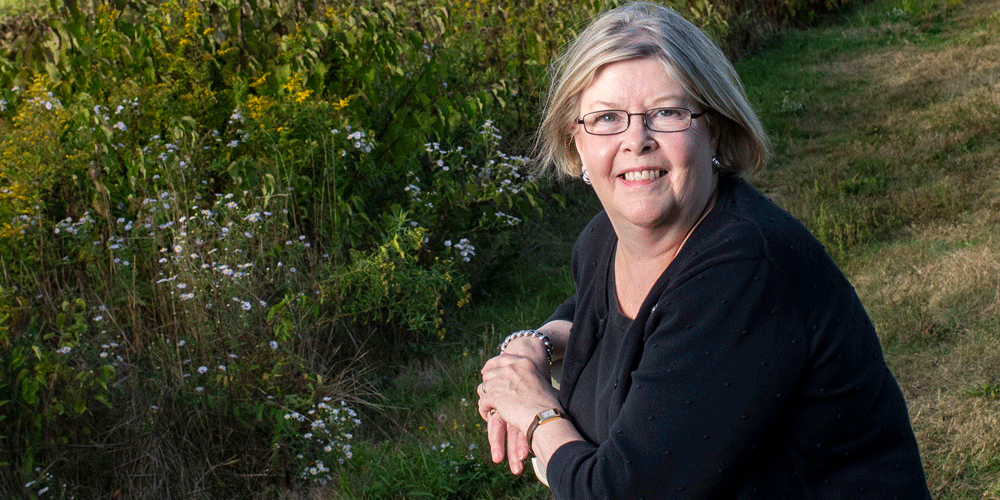Marjorie “Marjie” Nicholson

Deeply grateful for the care she received, Marjie decided to name the Brigham as a beneficiary of a commercial annuity, with the goal of advancing Dr. Du’s work and helping ensure that others who suffer such life-threatening aneurysms can make similarly remarkable recoveries. “There is such a need to support medical research, and there’s an outstanding group of people at the Brigham,” Marjie says. “I am proud to support them.”
Marjorie “Marjie” Nicholson was 64 when a near-fatal brain aneurysm turned her entire world upside down. Barely alive and able to communicate only by blinking her eyes, she initially wasn’t expected to survive, let alone recover.
But Marjie defied expectations and today leads a vibrant and active life, thanks to the care and support she received at Brigham and Women’s Hospital as well as her own hard work and determination.
It all began one February morning in 2012, when Marjie awoke with a horrendous headache and flu-like symptoms. She called her primary care doctor, who told her to go to the hospital. But Marjie was disoriented and confused and spent the next four days drifting in and out of consciousness at home. Worried when Marjie never showed up, her doctor alerted emergency services and Marjie was rushed from her home to her local hospital and, eventually, to the Emergency Department at the Brigham.
It was at the Brigham where neurosurgeon Rose Du, MD, PhD, took on Marjie’s case and provided what few others had been able to: unwavering hope that Marjie would recover and lead a productive life once again.
Dr. Du treated Marjie’s ruptured aneurysm as well as the complications that followed, including two strokes and hydrocephalus. All told, Marjie spent seven weeks in intensive care at the Brigham before leaving to begin the arduous journey to regain the skills she had lost and the life she had worked so hard to build over the years. Once fiercely independent, Marjie—who was used to taking care of everyone else—was now totally dependent on the kindness of others.
“I lost my right to make financial decisions and to drive a car. I lost my home and my identity,” Marjie says. “It was a challenging turn of events—and in the beginning, the challenges were overwhelming. I was fortunate to have a loving and supportive family and a neurosurgeon who wouldn’t give up!”
Fueled by her unrelenting perseverance—and with her two daughters, Mardie and Suzanne, and Dr. Du in her corner—Marjie made extraordinary strides in her recovery. Within just four months, she had moved from rehabilitation and assisted living facilities to an independent living community and no longer needed to use a walker or cane. Marjie had physically overcome the effects of the aneurysm and was able to walk, talk, write, and read again, but still struggled with a lack of attention and memory issues. She turned to brain exercises to overcome these challenges, and over the years has worked to reorient her memories and rebuild a rewarding life.
“I’ve traveled, honed my photography skills, exhibited my work, and established a new home,” says Marjie, whose excursions include trips to Alaska, Hawaii, Cuba, and Honduras, where she ziplined over the jungle.
And while so much has changed in her life since that fateful February morning nearly nine years ago, what has always remained is her gratitude for the exceptional care, encouragement, and support she received from Dr. Du and the entire Brigham team. She says Dr. Du didn’t just save her life—she gave her a reason to live.
“Dr. Du made me realize how important it is to live, and to give back,” says Marjie. She views the experience as a turning point in her life—one that opened up avenues that never would have presented themselves otherwise, such as the chance to launch a brain aneurysm support group with Dr. Du at the Brigham and become a passionate advocate for other brain aneurysm survivors. “Dr. Du gave me hope and the opportunity to live a productive and challenging life.”
Deeply grateful for the care she received, Marjie decided to name the Brigham as a beneficiary of a commercial annuity, with the goal of advancing Dr. Du’s work and helping ensure that others who suffer such life-threatening aneurysms can make similarly remarkable recoveries. In honor of Marjie’s generosity, the hospital welcomed her into The Brigham Legacy Society, which celebrates donors committed to shaping the future of medicine by including the Brigham in their estate plans.
“There is such a need to support medical research, and there’s an outstanding group of people at the Brigham,” Marjie says. “I am proud to support them.”
